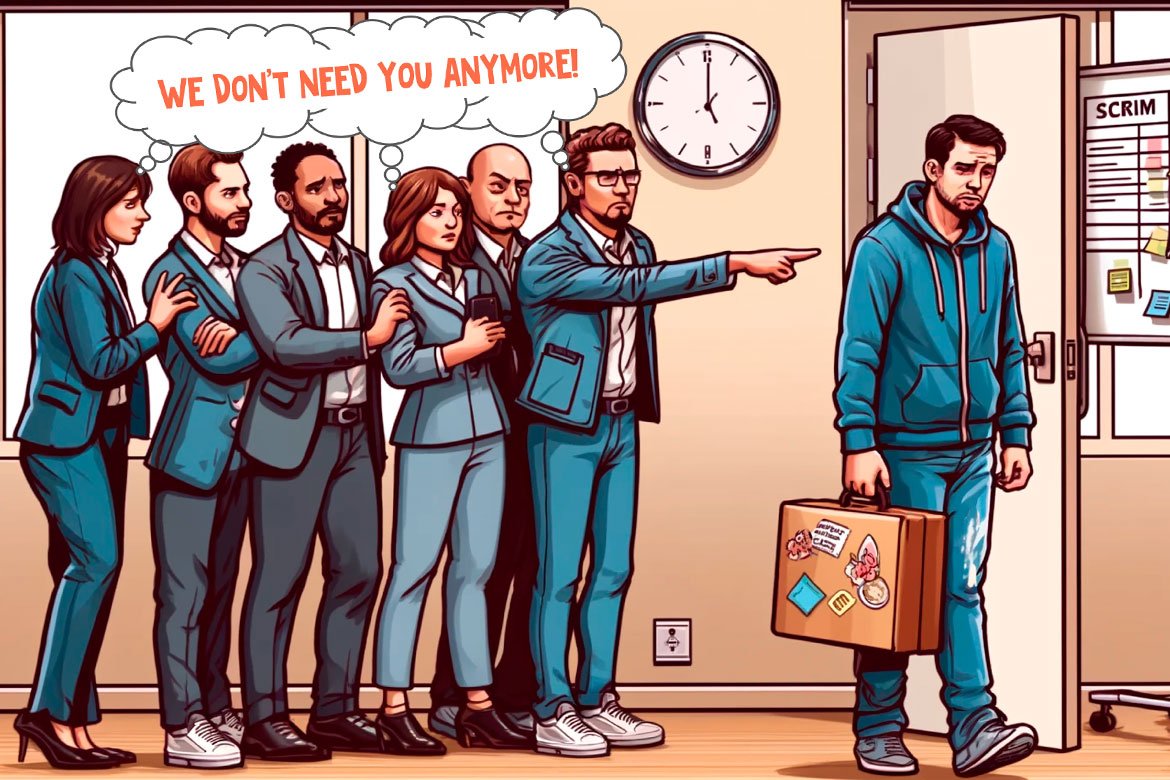I often encounter the question, “Does a mature team need a Scrum Master?” Most frequently, I am asked this during training sessions when I start a discussion about the purpose and necessity of a Scrum Master. Many people seem to think that there are some contradictions and ambiguities. Initially, we talk about a self-managing Scrum team, and then suddenly, there is a character in the team who is a manager but not a boss, and also a leader. The simplest way to imagine it is that the Scrum Master should teach the team Scrum, help establish an effective process for delivering value, and then leave when the team no longer needs them. But is this really the case?
Often, this question is clouded by a fundamental misunderstanding of what Scrum truly is and the distinct role a Scrum Master plays within this framework. It’s crucial to clarify these concepts to provide a detailed and accurate answer.
Many people conflate Scrum with any iterative delivery process, assuming that any team working in sprints or iterations is “doing Scrum.” However, this is a significant misunderstanding. Scrum is a specific framework with defined roles, events, artifacts, and rules designed to optimize team performance and product delivery. It is not just an iterative process but a comprehensive approach to managing work that includes critical principles and values.
Similarly, the role of the Scrum Master is often misunderstood. In some contexts, any facilitator or coordinator wears a label of a Scrum Master, which dilutes the true essence of this role within Scrum. To address whether a mature Scrum team needs a Scrum Master, we must first understand what Scrum truly entails and the precise responsibilities of a Scrum Master.
Who is Scrum Master in Scrum Framework
In the Scrum framework, the Scrum Master is not merely a manager or facilitator; they are a vital service provider to the team, the Product Owner, and the organization as a whole. The essence of a Scrum Master’s accountability lies in their commitment to ensuring that Scrum is understood and enacted, facilitating the empirical process that allows teams to adapt and improve continuously. This role is crucial for the success of Scrum and the continuous improvement of the team and its processes.
Service to the Developers
The Scrum Master serves the Developers by fostering an environment where they can be productive and self-organizing. This involves removing impediments that might hinder their progress and coaching them on how to use Scrum effectively. The Scrum Master ensures that the team adheres to Scrum practices while encouraging them to experiment and find the best way to work within the framework.
For Developers, the Scrum Master provides a crucial service by ensuring that the team can operate without disruptions. They address various obstacles, whether logistical issues, inter-personal conflicts, or organizational barriers, allowing the team to focus on delivering high-quality increments of the product. Additionally, the Scrum Master coaches the team in self-organization and cross-functionality, helping them become more effective and resilient over time.
Service to the Product Owner
For the Product Owner, the Scrum Master acts as a coach and facilitator, helping them manage the Product Backlog and communicate effectively with the team and stakeholders. The Scrum Master ensures that the Product Owner can maintain a clear vision and prioritize work to maximize the value delivered by the team.
The Scrum Master’s service to the Product Owner includes helping maintain a well-groomed Product Backlog, facilitating effective communication between the Product Owner and the team, and ensuring that the goals of the sprint are clear and achievable. They help the Product Owner understand and enact agile practices that maximize the value delivered by the team, ensuring that the Product Owner can perform their role effectively.
Service to the Organization
At the organizational level, the Scrum Master works to foster an environment that supports Scrum adoption and continuous improvement. This involves educating stakeholders about Scrum principles, facilitating collaboration across teams, and driving organizational change that removes systemic obstacles impeding team performance.
The Scrum Master’s service includes promoting Scrum adoption and facilitating changes that enhance the effectiveness of the Scrum Team. They educate stakeholders and other teams about Scrum, advocate for the team’s needs within the broader organization, and work to remove systemic impediments affecting the team’s ability to deliver value. Additionally, the Scrum Master collaborates with other Scrum Masters to share knowledge and improve Scrum practices across the organization.
The Evolution of the Scrum Master’s Focus
As a Scrum team matures, the focus of the Scrum Master evolves, but their importance does not diminish. In the early stages of Scrum adoption, the Scrum Master spends a significant amount of time working closely with the Development Team and the Product Owner. They coach the team on the fundamentals of Scrum, ensure that Scrum events are properly conducted, and help the team navigate the challenges of adopting a new way of working.
In these initial stages, the Scrum Master is deeply involved in facilitating Scrum events, such as daily stand-ups, sprint planning, sprint reviews, and retrospectives. They work to create an environment where the team can learn and improve continuously. This hands-on approach is critical for helping the team understand and embrace Scrum principles and practices.
As the team becomes more experienced and self-sufficient, the Scrum Master’s role begins to shift. The Development Team becomes more adept at self-organization and requires less day-to-day coaching. The Product Owner gains confidence in managing the Product Backlog and prioritizing work effectively. At this point, the Scrum Master’s focus increasingly turns towards the broader organizational context.
In this more mature phase, the Scrum Master works to extend the benefits of Scrum beyond the immediate team. They engage with other teams and departments, promoting Scrum practices and encouraging a culture of continuous improvement across the organization. The Scrum Master also works to address systemic issues that impact the team’s performance, such as organizational silos, inefficient processes, or lack of alignment between teams.
Despite this shift in focus, the Scrum Master remains an integral part of the team. They continue to facilitate key Scrum events and support the team in maintaining high standards of performance. They also serve as a coach and mentor, helping the team navigate new challenges and opportunities for growth. The Scrum Master’s role as a service provider evolves to meet the changing needs of the team and the organization, but their commitment to fostering a productive and collaborative environment remains constant.
The Endpoint
In conclusion, the need for a Scrum Master does not diminish as a team matures. While the focus of the Scrum Master’s role may shift from direct team coaching to broader organizational support, their presence remains invaluable. The Scrum Master ensures that the principles and practices of Scrum are upheld, facilitates continuous improvement, removes impediments, promotes a healthy Scrum culture, and supports organizational alignment.
Scrum is not merely an iterative process but a comprehensive framework that requires dedicated roles and responsibilities. Understanding this distinction is crucial for appreciating the ongoing value a Scrum Master brings to even the most mature and self-organized teams. Thus, in the context of true Scrum practice, the Scrum Master remains an essential part of the team, evolving alongside it to meet new challenges and drive sustained success.

